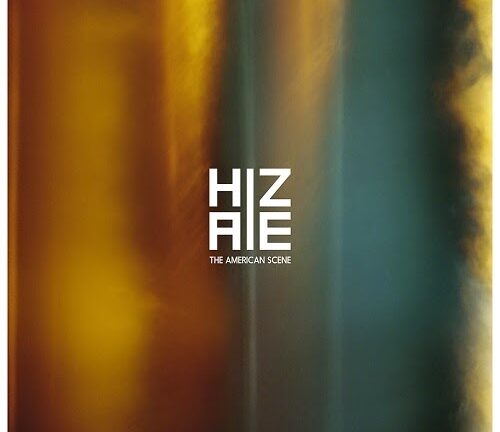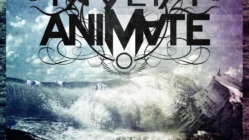The American Scene is a band from Berkeley, California…blah blah blah. You can find this on Facebook, so let’s cut to the chase. About two weeks ago, my editor and somewhat Internet friend Steven asked me if I wanted to review this album. All I knew about The American Scene is that I missed its set when I got to the Suppy Nation Tour two hours late last year and that the band is, well, from Berkeley, California. I said “yes” because exploring uncharted territories without having to leave my house was tempting, post-grad life is an endless abyss and, obviously, having a press copy of an unreleased album easily makes me hella cool, right? “Haze,” the title and opening track of the album, sets up The American Scene’s sound for the rest of the album; it’s nostalgic and even ironically somehow futuristic sounding. Lyrically, the repetition of “I don’t know who would want to live forever in this haze” is effective because it foreshadows the mood of this album. While “Haze” is as good as it can be, as far as opening songs usually go, it is the last 35 seconds of this song that really matter. The pure instrumentation is not necessarily anything innovative, but it is good enough that I will be damned if not at least one of your body parts has a motor reaction to it.
From the opening of “Royal Blue,” the second track, it is easy to understand why this is the single that got the music video. For one, it deviates from the trademark nostalgia that attaches itself to the rest of the tracks on Haze. Though it is still as incredibly wistful or even more so than the rest, there is something in the beginning that just gives it a good feeling. Perhaps it is because it sounds like something that could belong on a movie soundtrack or it’s the song that is most likely to make it on a slot of MTV2, which I don’t mean as a bad thing; in fact, it is a great thing because the song never disappoints from start to finish. The chorus is just as good as the opening and the ending of the chorus, the trailing of “I was a royal shade of blue,” does not take more than two plays to find yourself randomly singing it to yourself. The choice of shade of blue is clever as well because it points to a change in hues – a change in character – thus building on the mood of the album.
Like its predecessor, “Nails of Love” has a strong opening and one of the stickiest choruses; however, it builds more on “Haze,” and I wish it had not. While the futuristic sound is, in a word, sweet – the passivity, in another word, blows. Although it is a given that this is clearly the sound The American Scene is going for, it still left me with this feeling that something needed to be powered up to make this song go from decent to really good. “4th and Broadway” features, hands down, the best first 10 seconds of any track on Haze – and that is saying a lot, considering The American Scene has shown a distinct craftsmanship for memorable openings. The song takes a much slower change of pace shortly after, which is not a bad thing because it is ultimately the chorus that makes this song. It starts off with a swiftly sung, “I couldn’t call you, so I was smoking cigarettes on our front porch last night…,” then stretches and slows down with “It’s hard to trim it down.” Whatever the missed potential from the previous song’s chorus was, the contrast of both music and vocals is executed flawlessly in “4th and Broadway.”
“Dark Creak” did not have any particular lines that stood out to me and, while The American Scene are no lyrical geniuses, at least one or two lines in every other song on Haze easily stick. This song actually passed by me like a very low whisper because I could barely make out anything. That being said, as lyrically forgettable as this song is, it redeems itself in having great drumming parts, which made me think that this song was just one long drum sequence instead. Up next is “What I Could Gather.” The range of vocals in the chorus is lovely (it reminded me of a mid-2000s pop rock band called Acceptance) – yet, in comparison to the other choruses on Haze, this one is not strong enough. It is the last minute of “What I Could Gather” that stands out, though; it is a full length instrumental. It’s not as strong as the other shorter instrumental sections on the album, but it’s definitely still pleasant to the ears.
“Over to You” features another really strong opening by The American Scene, and I really enjoyed the instrumental section in this song from 2:17 to 2:30; in fact, I actually felt overwhelmed when the lyrics started to come back and I wish the pure instrumentation would have gone on for longer. Following “Over to You” is “White Widow.” I looked up what a white widow was under the impression that it might be something profound, but it’s just a type of cannabis. I assume the title was probably chosen to fit with the whole hazy theme of the album, but whatever the reason, the title works at carrying on the relaxed ambiance of Haze. Like a lot of the latter songs on this album, “White Widow” was too slow and calm for my taste, but the drumming near the end made this song worthwhile to me; however, like in previous songs, it made me wish the part of pure instrumentation went on for a bit longer because it works really well.
The first 15 seconds of “Drone” caught my attention specifically because the loud, obvious clashing sound in the background threw me off and amazed me. As awesome as those first 15 seconds were, this song – pun very much intended – droned on for me. I think it would have been more likable had it been one of the first songs rather than one of the last tracks so that I would not have already expected it – which is exactly the problem. It is almost too expected that not even the decent chorus could save “Drone” from boring me. Closing the album out is “Brume.” Apparently, brume is synonymous for haze, and it makes sense why the title of the last track mirrors the first. “Brume” is nothing special and it does not have to be because, like a lot closing songs, it is just there to sweep things up. I did appreciate the “This place contains no shadows / This place controls my conscience” parts, though. Both are very eerie in a good way – if eerie could ever be used in a good way.
Overall, Haze – even from the little I know and investigated from previous releases – is a solid release. While there are some hazy moments that could have been refined more (or even moments that just needed that extra ‘it’ factor to be great) and a few songs were borderline boring, this album definitely weighs out the sum of its parts, as there are some truly excellent moments of instrumentation and catchy choruses. It’s at least worth a full listen and your $10, but what do I know? I got access to the press release. I’m cool.




